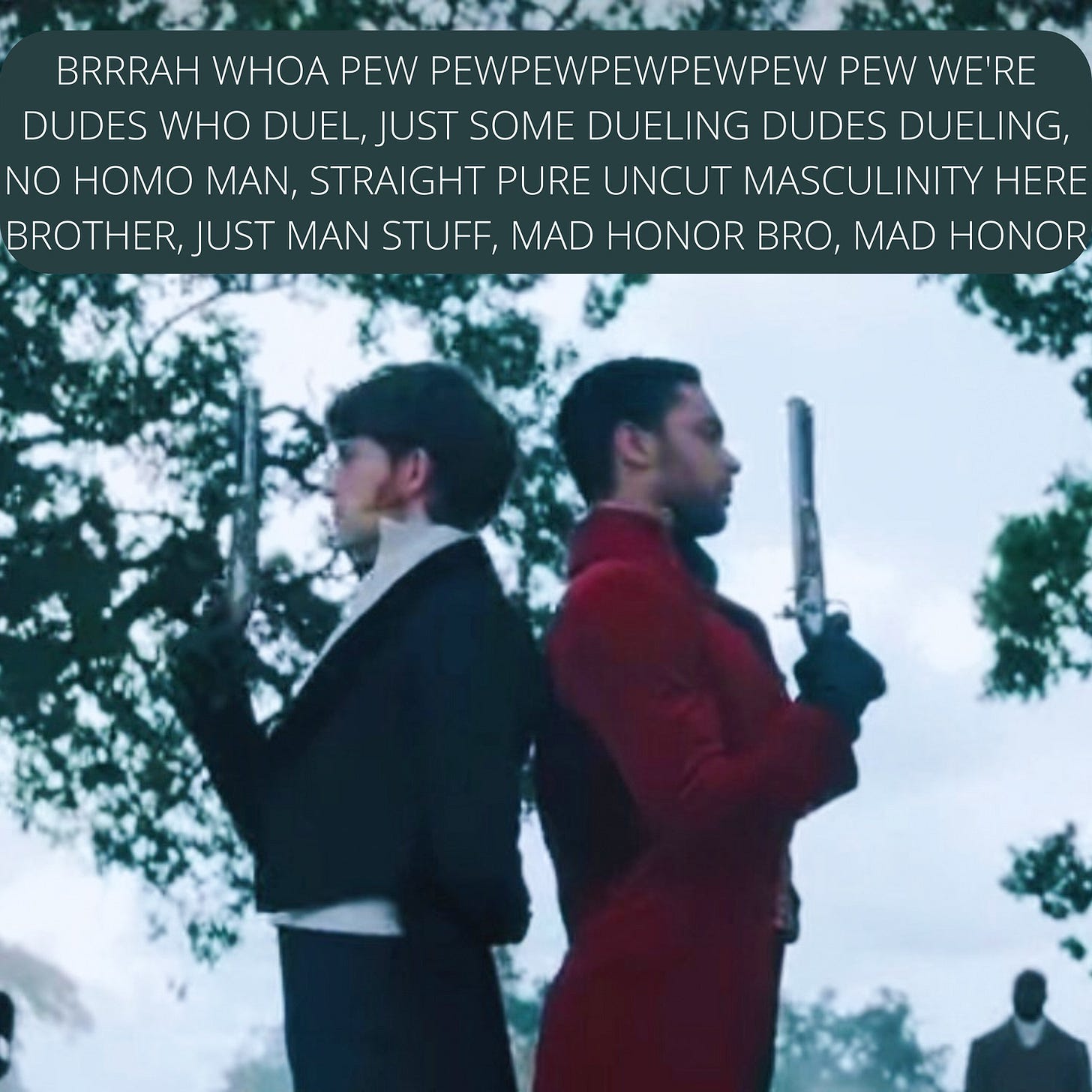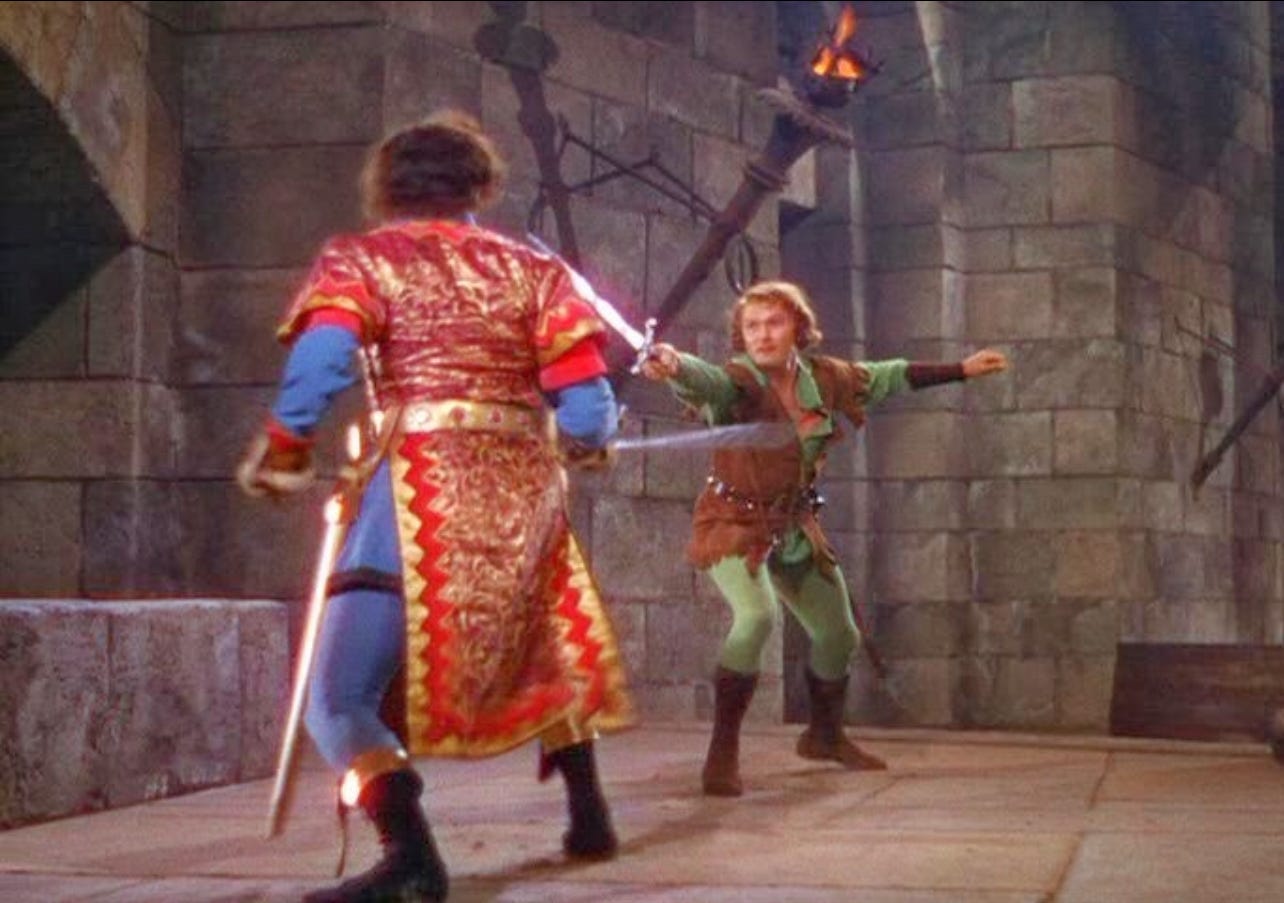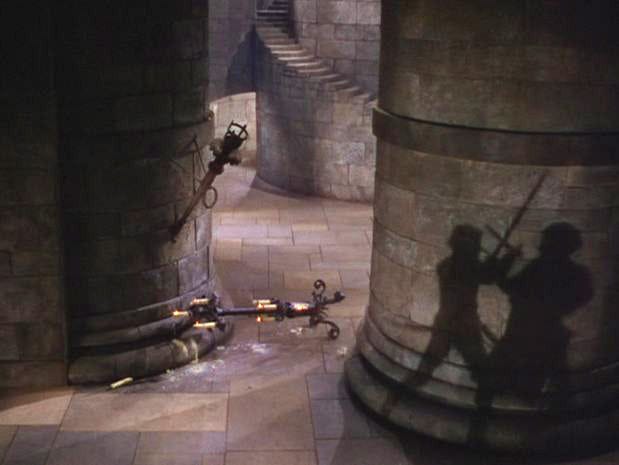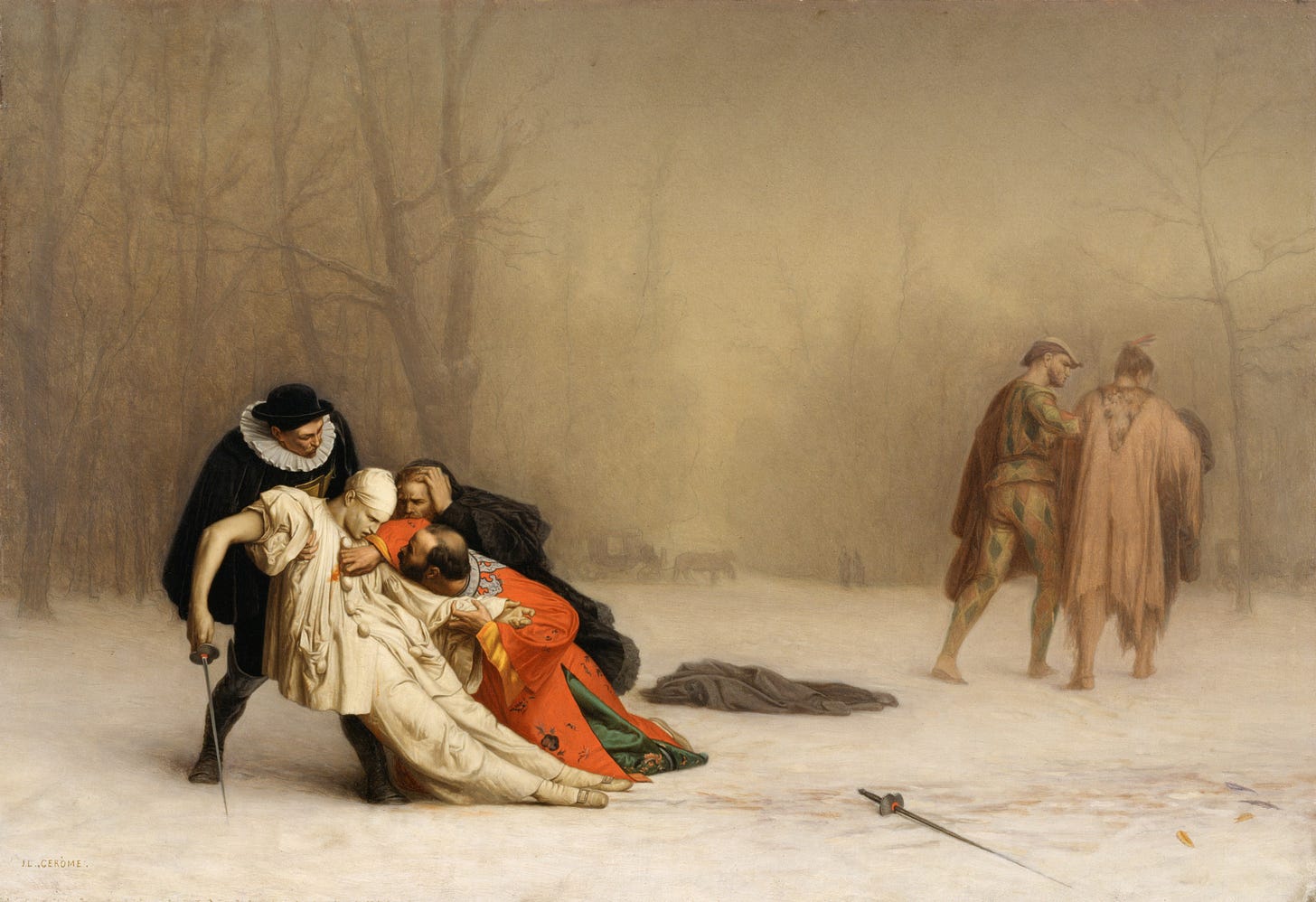Duels, Part I.
the idiocy of violent men — battle of the billionaires — who hath honour? — michael curtiz and errol flynn — tyranny
Here’s what happened.
About ten days ago I read something somewhere about the Elon Musk / Mark Zuckerberg cage match. (Musk had just suggested that maybe it would take place in the Roman Coliseum.) That same day I was poking around in the archives of the New York Review of Books and chanced upon a review by the great Marxist historian Christopher Hill of a study on dueling by the great Marxist historian Victor Kiernan. The thrust (heh) of the book, as relayed by Hill, is that during its heyday in European society, from the late Renaissance until WWI, the duel was a uniquely aristocratic pursuit. It was a way in which the increasingly superfluous upper classes could maintain their distinction in a world in which class distinctions were breaking down. Only gentlemen have the right to kill gentlemen, said the duel. Gentlemen will defend their reputation with their lives, said the duel. Gentlemen are, literally, a breed apart, said the duel.
It occurred to me, reading the review, that if the Musk/Zuckerberg thing happens it would more or less by definition be a duel. I thought that was Interesting and Timely, so I decided that’s what this week’s essay should be about. Never mind that these essays are intended to be about things I love and I love nothing about the idea of two preening billionaires playing to our basest impulses — this was interesting, this was timely, let’s do it. I tracked down a copy of the Kiernan book and read it. It depressed me. I read more about the peacocking billionaires. It depressed me. I tried to build a Very Interesting Piece to reach the Widest Possible Audience. It depressed me.

I’ve spent the last couple of days in a sort of crisis. What is the point of this essay? What is the point of the cage match? What is the point of existence? Duels have this bleak nihilism at their centre: honour is more important than life. “What is honour? A word. …Who hath it? He that died o’ Wednesday,” says Falstaff.
Part of my crisis was that in fiction I do love duels. Or I did, I thought I did, I once did — perhaps no longer, perhaps the billionaire boys have drained the joy from that as well. I realized if I didn’t broaden the scope of this piece it would end up a pointless, mirthless, despairing invective against violence and men and money — a young man and a fool raging vainly against the storm. So I decided to set their stupid duel against the dashing fictional duels I’ve always so enjoyed. But that’s when I discovered that maybe fictional duels are as stupid as real ones.

What is a duel? Ritualized combat between two people (nearly always men because men are prone to witless violence). The ritual aspect is key — it is not a spontaneous brawl. It is premeditated, and it is conducted according to rules. Those rules vary by time, place, and culture, but they are always present. Usually there’s a waiting period between the issuing of a challenge and the actual combat. Time for heads to cool — which on the one hand theoretically allows for calmer voices to intervene and apologies to be made; but on the other adds to the ghoulish aspect of so many duels: lives were lost in cold blood over punctilios of honour about which no one especially cared just because that’s what was done. (In Italy a duel was once fought over whether Ludovico Ariosto or Torquato Tasso was the better poet. As he lay dying, Tasso’s champion admitted that he’d never actually read either author. Why do men do this shit?)
If Musk and Zuckerberg fight they will have help arranging it. Dana White of the UFC has offered to organize it. Jake Paul (Logan Paul?) has said he’ll put up a hundred million dollar prize purse. Zuckerberg has begun posting shirtless photos of himself training, flanked by other sweaty fighters. The combatants are not operating in a vacuum. Each is backed by supporters and enablers and hype-men. Each, in other words, has seconds. The presence of seconds is meant to elevate the violence from bestial to civilized — the seconds tacitly condone the bloodshed and therefore ritualize it. If two people who are angry at each other fight that’s just a fight, but if you add to the equation people who are not angry at each other but who are helping to see that the fight is conducted in a particular manner then it becomes a duel.
The word “duel” entered English in the 1590s, from Latin via French. It first, true to the Latin, meant only combat. But within less than twenty years it had gained the formalized, ritualized element. It was not just violence, it was acceptable violence. Fighting a duel was not only culturally sanctioned, it was culturally obligatory. One of Alexander Hamilton’s seconds pointed out that, while we speak of fighting a duel as though it’s a courageous act, it would in fact take much more courage not to fight. In combat you risk only your life; in refusal you risk your reputation. (Achilles knew that by going to fight at Troy he would die young — but chose to do it anyway so that his name would be remembered forever.)
Physical courage is extremely compelling. A person willing to risk their life for something they believe in sits apart from much of humanity. There is little for which I would choose to stare down a loaded pistol. To do so unthinkingly, as a matter of course and a matter of station and for no reason in particular, is, certainly, insane — but it’s a swaggeringly romantic sort of insanity. There’s panache in the devil-may-care imbecility of dying for the merits of a poet you have not read.

But that panache blinded me to an important distinction. As I was pulling images for this piece I went right away to sword fights in movies I love — first and foremost to the greatest of all cinematic duels in the greatest of all movies, Errol Flynn and Basil Rathbone in the 1938 Adventures of Robin Hood. But then I was perplexed: their fight isn’t really a duel. It’s not fought according to rules. They have no seconds. At issue isn’t a question of honour but a question of—
Oh holy shit. Since this has plainly changed from being about the Musk/Zuckerberg thing to being an account of the collapse-through-sloppy-thinking of my original essay, let me say in real time that I just — right now, between the abrupt end of that last paragraph and the beginning of this one — discovered something I should have realized decades ago.
Morality is the word I was looking for: at issue in the ’38 Robin Hood is a question not of honour but of morality and justice. Rathbone’s Guy of Gisbourne is an evil bully who abuses and kills people because of who they are — because they were born Saxon, not Norman. That Saxon/Norman ethno-cultural divide is hammered home again and again in a way it is in no other version of the Robin Hood story. The movie (I just realized) was made during the rise of Nazi Germany, was conceived of by the American-Jewish producer Hal B. Wallis, and was directed by the Hungarian-Jewish émigré Michael Curtiz (the two would go on to make Casablanca together). The fact that the villains of the piece persecute a distinct group of people and that the heroes are a resistance cell who fight against that persecution is not an accident.
“You’re a strange man,” says Maid Marian.
“Strange because I can feel for beaten, helpless people?” says Robin Hood.
“No, you’re strange because you want to do something about it.”
This at the height of America’s isolationist policy, at the depths of our shameful, murderous quotas on Jewish refugees. We could have saved so many lives but we chose not to. (Go watch Ken Burns’s recent documentary The US and the Holocaust.)
The Flynn/Rathbone engagement isn’t a duel at all. It’s a fight against injustice. The movie is an anti-fascist allegory and I never realized it, or never realized I realized it, until just now. How wonderful.

My mistake was laziness of language — referring to any combat between any two people as a duel. Bad writing leads to bad thinking and vice versa. A duel is distinct, it is violence for the sake of violence. In a duel it does not matter who wins — a duel begins with a demand for satisfaction and ends when honour has been satisfied, which it is by the act of fighting. Even if you lose you have redeemed your tarnished honour. But when Robin fights Gisbourne it does matter who wins. Lives beyond their own hang in the balance. That’s the difference.
Musk recently tweeted at Zuckerberg, “Let’s have a literal dick measuring contest,” followed by a ruler emoji. I hope they do. It would be no less stupid than the spectacle of two middle aged men who between them have the power to end global hunger but choose not to pummeling each other under hot lights for our entertainment and the sake of their egos. A dick measuring contest would at least have the redeeming merit of being funny.
I need to think about all this more and better. I’ll pick it up next week. ∎







Let’s measure twice and then have a pissing contest! They could use penis as the choice of weapon on this, at 2 feet. (Ref Abe lincoln duels w/horseshit) Then I’d be amused by A further ruler-type ‘application’…as in…’Bailiff, WHACK his peepee!’—both of ‘em, actually, (Ref 60’s tv-DanRowan/Dick Martin). Then leave ‘em caged for a bit. See who cries first….
Delightful musings…thank you!💚
Please DO remain amused, as the scaffolding in this global theatre caves in. 😎👏